高中英语语法之7动词语态
图片预览
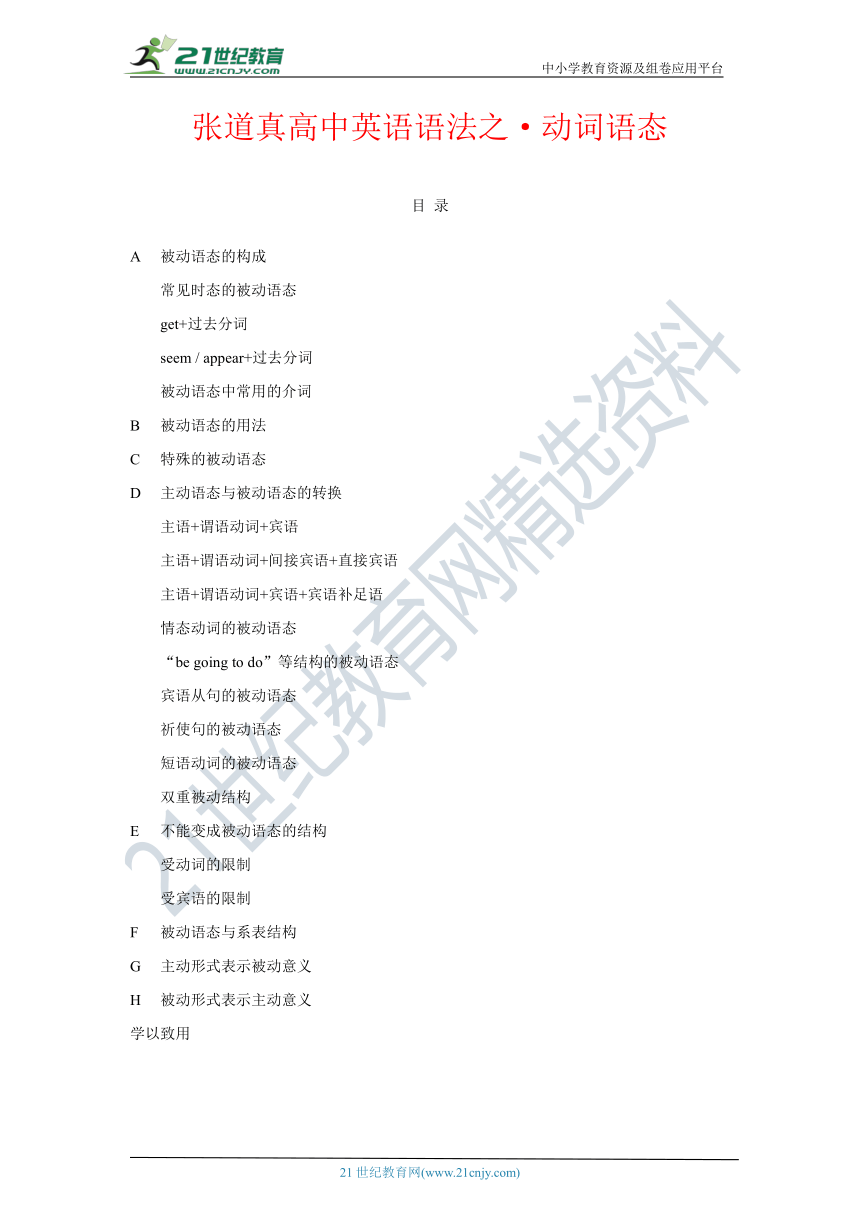
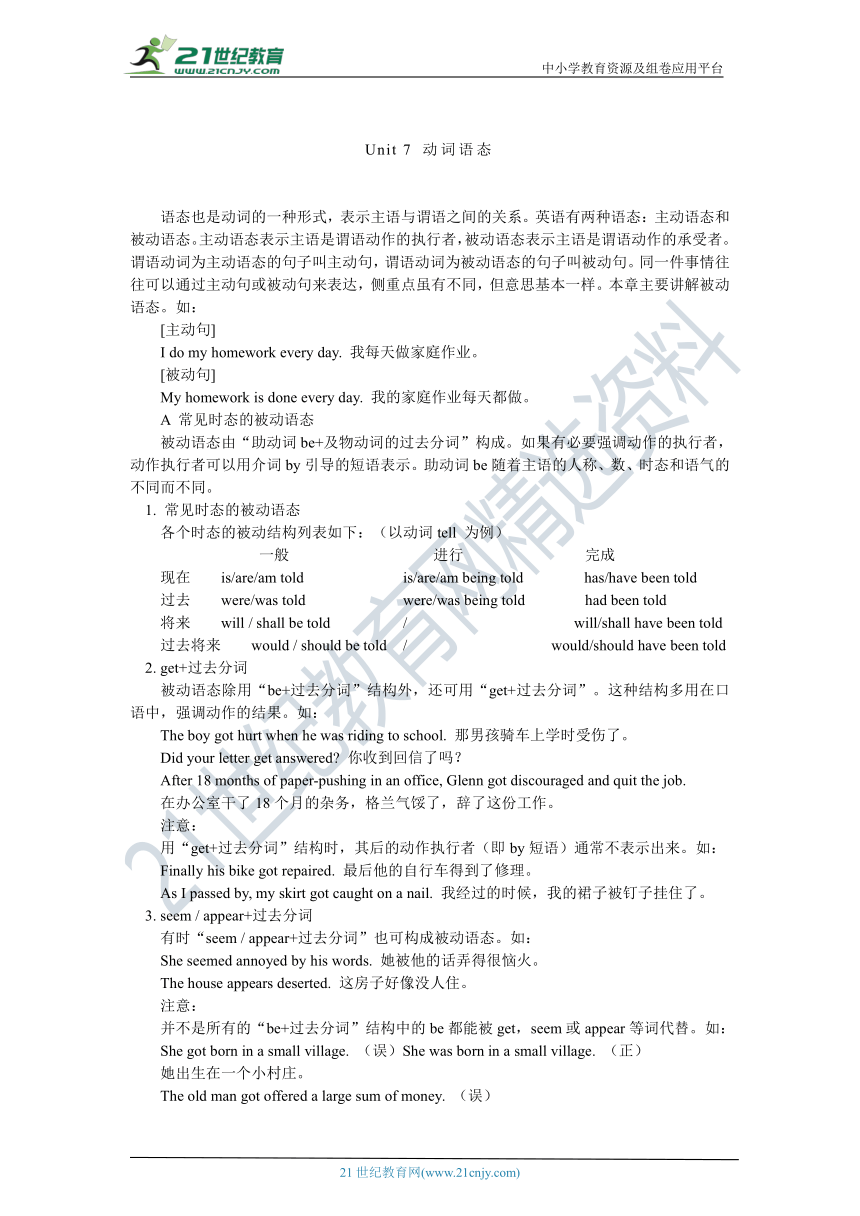
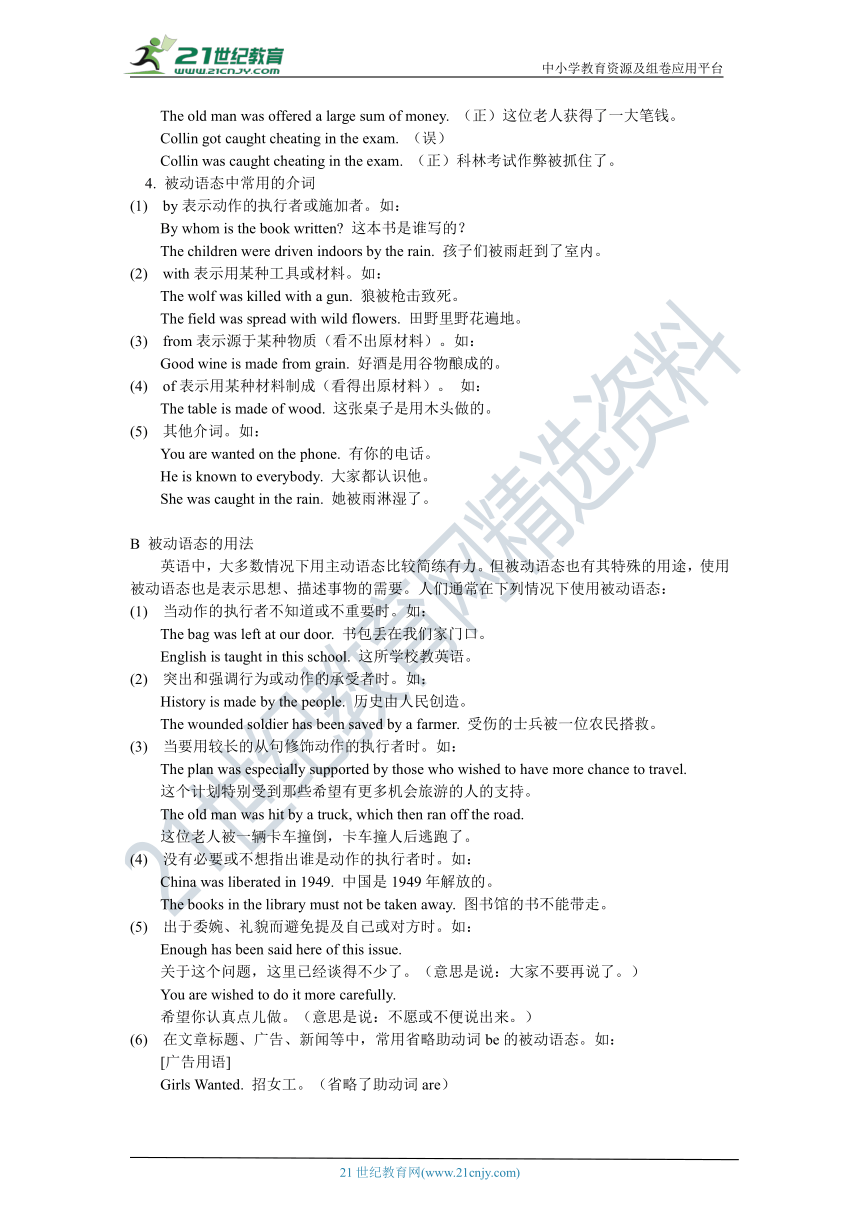
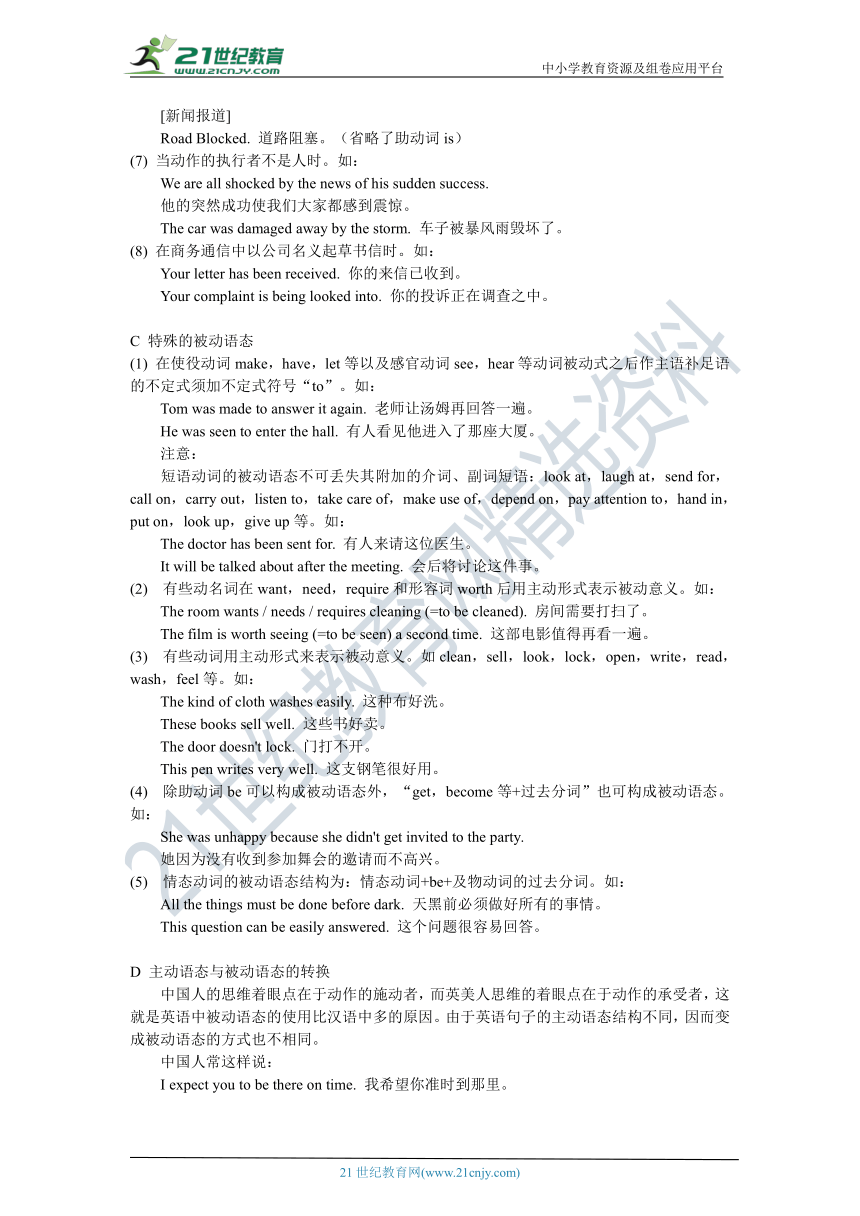
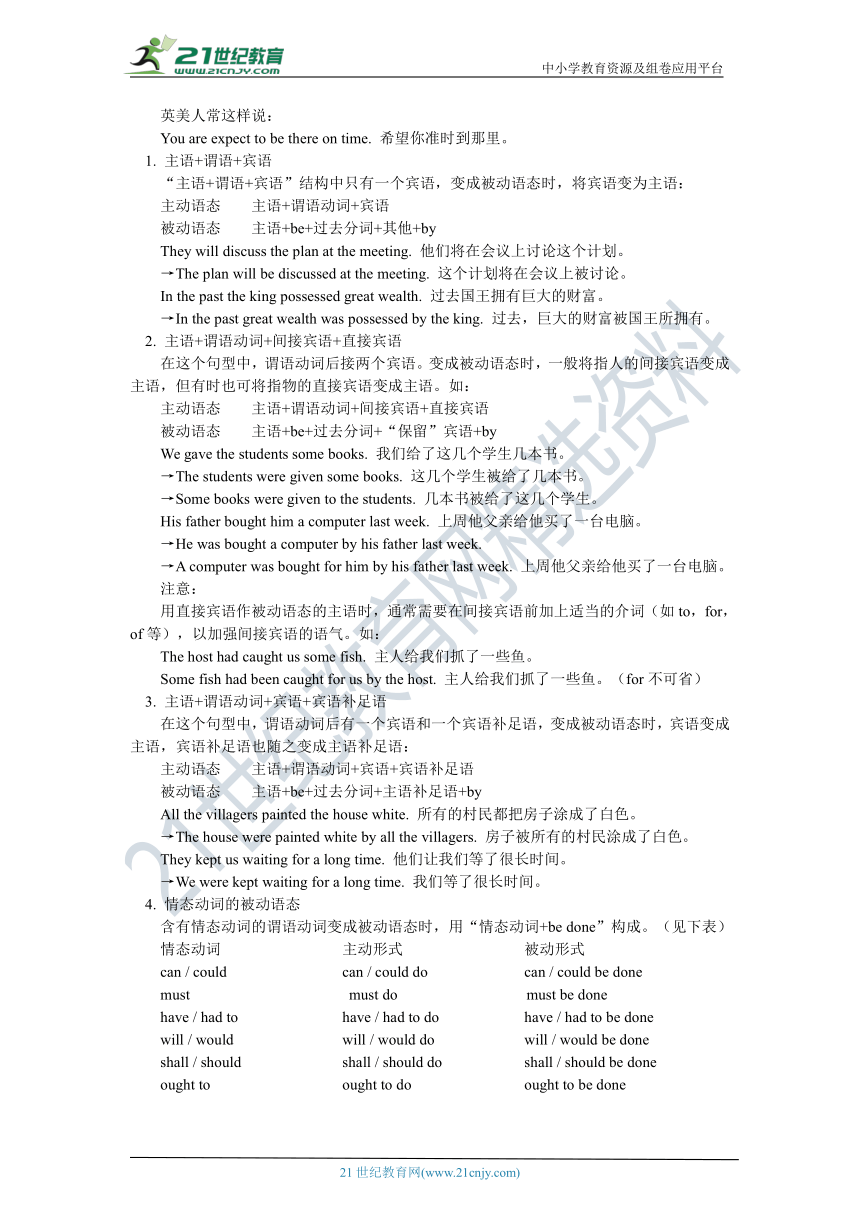
文档简介
中小学教育资源及组卷应用平台
张道真高中英语语法之·动词语态
目 录
A 被动语态的构成
????常见时态的被动语态
????get+过去分词
????seem / appear+过去分词
????被动语态中常用的介词
B 被动语态的用法
C 特殊的被动语态
D 主动语态与被动语态的转换
????主语+谓语动词+宾语
????主语+谓语动词+间接宾语+直接宾语
????主语+谓语动词+宾语+宾语补足语
????情态动词的被动语态
???? “be going to do”等结构的被动语态
????宾语从句的被动语态
????祈使句的被动语态
????短语动词的被动语态
????双重被动结构
E 不能变成被动语态的结构
????受动词的限制
????受宾语的限制
F 被动语态与系表结构
G 主动形式表示被动意义
H 被动形式表示主动意义
学以致用
Unit 7 动词语态
语态也是动词的一种形式_???è?¨?¤????è?????_谓语之间的关系。英语有两种语态:主动语态和被动语态。主动语态表示主语是谓语动作的执行者,被动语态表示主语是谓语动作的承受者。谓语动词为主动语态的句子叫主动句,谓语动词为被动语态的句子叫被动句。同一件事情往往可以通过主动句或被动句来表达,侧重点虽有不同,但意思基本一样。本章主要讲解被动语态。如:21*cnjy*com
[主动句]
I do my homework every day. 我每天做家庭作业。
[被动句]
My homework is done every day. 我的家庭作业每天都做。
A 常见时态的被动语态
被动语态由_????????¨è??be_+及物动词的过去分词”构成。如果有必要强调动作的执行者,动作执行者可以用介词by引导的短语表示。助动词be随着主语的人称、数、时态和语气的不同而不同。
1. 常见时态的被动语态
各个时态的被动结构列表如下:(以动词tell 为例)
一般 进行 完成
现在 is/are/a_m_told_ is/are/am being told has/have been told
过去 were/was told were/was being told had been told
将来 will / s_hall_b_e told / will/shall have been told
过去将来 __ woul_d / should be told / would/should have been told
2. get+过去分词
被动语态除用“be+过去分词”结构外,还可用“get+过去分词”。这种结构多用在口语中,强调动作的结果。如:
The boy got hurt when he was riding to school. 那男孩骑车上学时受伤了。
Did your letter get answered? 你收到回信了吗?
After 18 mont_hs_of__paper-pushing in an office, Glenn got discouraged and quit the job.
在办公室干了18个月的杂务,格兰气馁了,辞了这份工作。
注意:
用“get+过去分词”结构时,其后的动作执行者(即by短语)通常不表示出来。如:
Finally his bike got repaired. 最后他的自行车得到了修理。
As I passed by, my skirt got caught on a nail. 我经过的时候,我的裙子被钉子挂住了。
3. seem / appear+过去分词
有时“seem / appear+过去分词”也可构成被动语态。如:
She seemed annoyed by his words. 她被他的话弄得很恼火。
The house appears deserted. 这房子好像没人住。
注意:
并不是所有的“be+过去分词”结构中的be都能被get,seem或appear等词代替。如:
She got born _in_a_s_mall village. (误)She was born in a small village. (正)
她出生在一个小村庄。
The old man got offered a large sum of money. (误)21cnjy.com
The old man was offered a large sum of money. (正)这位老人获得了一大笔钱。
Collin got caught cheating in the exam. (误)
Collin was caught cheating in the exam. (正)科林考试作弊被抓住了。
4. 被动语态中常用的介词
(1) by表示动作的执行者或施加者。如:
By whom is the book written? 这本书是谁写的?
The children were driven indoors by the rain. 孩子们被雨赶到了室内。
(2) with表示用某种工具或材料。如:
The wolf was killed with a gun. 狼被枪击致死。
The field was spread with wild flowers. 田野里野花遍地。www-2-1-cnjy-com
(3) from表示源于某种物质(看不出原材料)。如:
Good wine is made from grain. 好酒是用谷物酿成的。
(4) of表示用某种材料制成(看得出原材料)。 如:
The table is made of wood. 这张桌子是用木头做的。
(5) 其他介词。如:
You are wanted on the phone. 有你的电话。
He is known to everybody. 大家都认识他。
She was caught in the rain. 她被雨淋湿了。
B 被动语态的用法
英语中,大多数情况_?????¨?????¨è?????_比较简练有力。但被动语态也有其特殊的用途,使用被动语态也是表示思想、描述事物的需要。人们通常在下列情况下使用被动语态:
(1) 当动作的执行者不知道或不重要时。如:
The bag was left at our door. 书包丢在我们家门口。
English is taught in this school. 这所学校教英语。
(2) 突出和强调行为或动作的承受者时。如:
History is made by the people. 历史由人民创造。
The wounded soldier has been saved by a farmer. 受伤的士兵被一位农民搭救。
(3) 当要用较长的从句修饰动作的执行者时。如:
The plan was esp_eciall_y supported by those who wished to have more chance to travel.
这个计划特别受到那些希望有更多机会旅游的人的支持。
The old man was hit by a truck, which then ran off the road. 2-1-c-n-j-y
这位老人被一辆卡车撞倒,卡车撞人后逃跑了。
(4) 没有必要或不想指出谁是动作的执行者时。如:
China was liberated in 1949. 中国是1949年解放的。
The books in the library must not be taken away. 图书馆的书不能带走。
(5) 出于委婉、礼貌而避免提及自己或对方时。如:
Enough has been said here of this issue.
关于这个问题,这里已经谈得不少了。(意思是说:大家不要再说了。)
You are wished to do it more carefully.
希望你认真点儿做。(意思是说:不愿或不便说出来。)
(6) 在文章标题、广告、新闻等中,常用省略助动词be的被动语态。如:
[广告用语]
Girls Wanted. 招女工。(省略了助动词are)
[新闻报道]
Road Blocked. 道路阻塞。(省略了助动词is)
(7) 当动作的执行者不是人时。如:
We are all shocked by the news of his sudden success. 21教育名师原创作品
他的突然成功使我们大家都感到震惊。
The car was damaged away by the storm. 车子被暴风雨毁坏了。
(8) 在商务通信中以公司名义起草书信时。如:
Your letter has been received. 你的来信已收到。
Your complaint is being looked into. 你的投诉正在调查之中。
C 特殊的被动语态
(1) 在使役动词make,have,let等以及感官动词see,hear等动词被动式之后作主语补足语的不定式须加不定式符号“to”。如:
Tom was made to answer it again. 老师让汤姆再回答一遍。
He was seen to enter the hall. 有人看见他进入了那座大厦。
注意:
短语动词的被动语_?????????????¤±???_附加的介词、副词短语:look at,laugh at,send for,call on,carry out,listen to,take care of,make use of,depend on,pay attention to,hand in,put on,look up,give up等。如:
The doctor has been sent for. 有人来请这位医生。
It will be talked about after the meeting. 会后将讨论这件事。
(2) 有些动名词在want,need,require和形容词worth后用主动形式表示被动意义。如:
The r_oom_wa_nts / needs / requires cleaning (=to be cleaned). 房间需要打扫了。
The film is worth seeing (=to be seen) a second time. 这部电影值得再看一遍。
(3) 有些动词用主动形式来_è?¨?¤?è????¨??????_。如clean,sell,look,lock,open,write,read,wash,feel等。如:
The kind of cloth washes easily. 这种布好洗。
These books sell well. 这些书好卖。
The door doesn't lock. 门打不开。
This pen writes very well. 这支钢笔很好用。
(4) 除助动词be可以构成被动语态外,“get,become等+过去分词”也可构成被动语态。如:
She was unhappy because she didn't get invited to the party.
她因为没有收到参加舞会的邀请而不高兴。
(5) 情态动词的被动语态结构为:情态动词+be+及物动词的过去分词。如:
All the things must be done before dark. 天黑前必须做好所有的事情。
This question can be easily answered. 这个问题很容易回答。
D 主动语态与被动语态的转换
中国人的_?????????????????¨_于动作的施动者,而英美人思维的着眼点在于动作的承受者,这就是英语中被动语态的使用比汉语中多的原因。由于英语句子的主动语态结构不同,因而变成被动语态的方式也不相同。【来源:21·世纪·教育·网】
中国人常这样说:
I expect you to be there on time. 我希望你准时到那里。
英美人常这样说:
You are expect to be there on time. 希望你准时到那里。
1. 主语+谓语+宾语
“主语+谓语+宾语”结构中只有一个宾语,变成被动语态时,将宾语变为主语:
主动语态 主语+谓语动词+宾语
被动语态 主语+be+过去分词+其他+by
They will discuss the plan at the meeting. 他们将在会议上讨论这个计划。
→The plan will be discussed at the meeting. 这个计划将在会议上被讨论。
In the past the king possessed great wealth. 过去国王拥有巨大的财富。
→In th_e_past_ great wealth was possessed by the king. 过去,巨大的财富被国王所拥有。
2. 主语+谓语动词+间接宾语+直接宾语
在这个句型中,谓语动词后接两个宾语。变成被动语态时,一般将指人的间接宾语变成主语,但有时也可将指物的直接宾语变成主语。如:21*cnjy*com
主动语态 主语+谓语动词+间接宾语+直接宾语
被动语态 主语+be+过去分词+“保留”宾语+by
We gave the students some books. 我们给了这几个学生几本书。
→The students were given some books. 这几个学生被给了几本书。
→Some books were given to the students. 几本书被给了这几个学生。
His father bought him a computer last week. 上周他父亲给他买了一台电脑。
→He was bought a computer by his father last week.
→A computer wa_s_boug_ht for him by his father last week. 上周他父亲给他买了一台电脑。
注意:
用直接宾语作被动语态的主语时,通常需要在间接宾语前加上适当的介词(如to,for,of等),以加强间接宾语的语气。如:
The host had caught us some fish. 主人给我们抓了一些鱼。
Some fish had been caught for us by the host. 主人给我们抓了一些鱼。(for不可省)
3. 主语+谓语动词+宾语+宾语补足语
在这个句型中,谓语动词后有一个宾语和一个宾语补足语,变成被动语态时,宾语变成主语,宾语补足语也随之变成主语补足语:
主动语态 主语+谓语动词+宾语+宾语补足语
被动语态 主语+be+过去分词+主语补足语+by
All the villagers painted the house white. 所有的村民都把房子涂成了白色。
→The house were painted white by all the villagers. 房子被所有的村民涂成了白色。
They kept us waiting for a long time. 他们让我们等了很长时间。2·1·c·n·j·y
→We were kept waiting for a long time. 我们等了很长时间。
4. 情态动词的被动语态
含有情态动词的谓语动词变成被动语态时,用“情态动词+be done”构成。(见下表)
情态动词 主动形式 被动形式
can / could can / could do can / could be done
must must do must be done
have / ha_d_to___ have / had to do have / had to be done
will _/_woul_d will / would do will / would be done
shall / should shall / should do shall / should be done
ought to ought to do ought to be done
may / might may / might do may / might be done
The machine must be operated with care. 这台机器必须小心操作。
Such a sentence ought not to be used here. 这样一个句子不应该用在这里。
People had to be reminded of the danger that night. 那天晚上必须提醒人们注意安全。
5. “be going to do”等结构的被动语态
含有be going _to_do???_be to do等结构的谓语动词变成被动语态时,分别用be going to be done或be to be done。在这两种结构中,be只有一般现在时和一般过去时两种形式。如:
The problem is going to be discussed at the meeting. 这个问题将在会上讨论。
This new film is to be shown on TV next week. 这部新片下周将在电视上放映。
6. 宾语从句的被动语态
带有宾语从句的主动语态变成被动语态时,通常用it作被动语态的形式主语,宾语从句保留不变。如:
They said that he had gone abroad to study English. 他们说他出国学英语去了。
→It was said that he had gone abroad to study English. 据说他出国学英语去了。
We haven't decided when we should go camping.我们还未决定什么时候去野营。
→It hasn't been decided when we should go camping. 什么时候去野营尚未决定。
注意:
带有宾语从句的句子变成被动语态时,为了简练,还可把从句的主语变成被动句的主语,从句的谓语部分变成不定式短语。如:21世纪教育网版权所有
We believed that he would succeed. 我们相信他会成功。
→He was believed to be succeed. 相信他会成功。
Father expected that I should become an engineer. 【版权所有:21教育】
父亲希望我成为工程师。
→I was expected (by father) to become an engineer.
(父亲)希望我成为工程师。
7. 祈使句的被动语态
肯定祈使句的被_??¨è??????????????_:Let+宾语+be+过去分词;否定祈使句的被动语态结构为:Don't+let+宾语+be+过去分词(或Let+宾语+not+be+过去分词)。如:
Move the desks into the corridor.
→Let the desks be moved into the corridor. 把课桌搬到走廊。
Don't trust her.
→Don't let her be trusted. 或Let her not be trusted. 不要相信她。
8. 短语动词的被动语态
通常情况下,_??????????????¨è??_才能接宾语,不及物动词不能接宾语,所以只有及物动词才有被动语态,不及物动词没有被动语态。但有些不及物动词后面跟上介词或副词后,变成一个短语动词,相当于一个及物动词,因此也可以有被动语态。如:
The nurse in this hospital look after the patient very well.
这所医院里的护士们很周到地照顾病人。
→The patients are well looked after by the nurse in this hospital.
在这所医院,病人被护士们照料得很周到。
They have put off the meeting till next week. 他们把会议推迟到了下周。
→The meeting has been put off till next week. 会议被推迟到了下周。
注意:
在使用被动语态时,千万不要遗漏句末的介词或副词。如:
Such a bad habit should be got rid of. 这样的坏习惯应该改掉。
9. 双重被动结构
双重被动结构指的是句中谓语动词和其后的不定式均为被动结构,句子的主语既是谓语动词的承受者,又是不定式动作的承受者。如:
They asked us to discuss the problem at once.
→We were asked to discuss the problem at once.或
The problem was asked to be discussed at once. 这个问题被要求立即讨论。
The teacher ordered that we should take the desk away.
→The desk was ordered to be taken away. 课桌被要求搬走。
E 不能变成被动语态的结构
1. 受动词的限制
(1) 某些表示状态的及物_??¨è????????ha_ve,own,cost,lack,want,become,fit,resemble,fail,last,flee,benefit,hold等作谓语时,不能变成被动句,只能用于主动语态。如:
She resembles her mother. 她长得像她母亲。
This hall can hold 2,000 people. 这个大厅能容纳2 000人。
Todd lacks self-confidence. 托德缺乏自信。
(2) 当及物动词have表示“吃饭、患病、明白、知道”等意思时,没有被动语态。如:
Would you have a cup of tea? 你要喝茶吗?
Amy had a bad cold yesterday, and now she is feeling much better. 【出处:21教育名师】
昨天艾米得了重感冒,现在好多了。
(3) 当动词get,_takeè?¨?¤?_“懂得、知道”,owe表示“欠”,cost表示“使失去(生命、健康等)”的意思时,动词没有相应的被动语态。如:
Do you get me? 你明白我的意思吗?
How do you take this passage? 你怎么理解这段话?
His careless driving cost him his life. 他的粗心驾驶使他丧了命。
2. 受宾语的限制
(1) 当宾语是相互代词、反身代词或具有类似相互代词的关系时,动词不能用于被动语态。如:
For years the two sisters looked after one another. 多年来两姐妹互相照顾。
They simply cannot contain themselves for joy. 他们简直无法抑制内心的喜悦。
He absented himself from a meeting yesterday. 他昨天缺席会议了。
(2) 当宾语前带有主语的形容词性物主代词时,谓语动词通常不能转换为被动语态。如:
I could not believe my eyes when I saw him still alive.
看到他还活着,我简直不敢相信自己的眼睛。
The doctor shook his head and then went out without any words.
医生摇了摇头,一句话也没说就出去了。
(3) 当宾语起状语作用,表示数量、重量、大小或程度时,不能用于被动语态。如:
This kind of dictionary costs ten dollars. 这种字典值10美元。
The case weighs twenty kilos. 这箱子重20千克。
(4) 当宾语是同源宾语时,通常不能转换成被动语态。如:
Robin laughed a hearty laugh. 罗宾由衷地笑了笑。
Etta dreamt a sweet dream. 埃塔做了一个美梦。
(5) 如果宾语是动词不定式或动词-ing形式时,谓语动词通常不能变成被动语态。如:
Peter decided to go and study abroad. 彼得决定出国留学。
Sean admitted having done wrong. 肖恩承认做错了。
(6) 如果enter,leave,reach的宾语是表示地点、国家机关等名词时,不能变成被动语态。如:
Lance left the army in 1998. 兰斯1998年退伍。
The beautiful girl entered the hall at once. 那位漂亮的女孩立即走进了大厅。
(7) 不可拆开的_???è????¨è????????_take place,lose heart,belong to,consist of,change colour等,也不能变成被动语态。如:
The book belongs to me. 这本书是我的。
The boy didn't lose heart. 男孩没有丧失勇气。
An expe_rt_can_ change color, add or take out objects, add people or beings who are not real.
专业人员可以改变背景颜色,增减背景物,添加人物或模拟人。
(8) 含有would rather或情态动词dare的句子,不能变为被动语态。如:
I would rather do it now. 我宁可现在就做这件事。
He dare not do it. 他不敢做那件事。
F 被动语态与系表结构
被动语态中的过去_???è???????¨è?????_多强调动作;系表结构中的-ed形式相当于形容词,多强调状态。前者通常可用“by+名词”表动作的执行者,而后者通常不这样用。如:
[被动结构]
The gate to the garden was locked by the girl. 去花园的大门被那个女孩锁上了。
The tree was blown down by the winds. 那棵树被风吹倒了。
[系表结构]
The gate to the garden was locked. 花园门锁了。
The tree was blown down when we saw it. 当我们看到那棵树时,它已经被风吹倒了。
注意:
少数“连系动词be+作表语的动词-ed形式”也带有by短语。如:
The old man was surrounded by small children.
那位老人被孩子们围住了。(被动语态)
Guilin is surrounded by hills and mountains. 桂林被山环绕。(系表结构)
We were held up by fog. 我们因雾受阻。(被动结构)
The tree is known by its fruit. 看到果子就知道这是什么树。(系表结构)
(1) 系表结构只用于一般现在时、一般过去时等少数几种时态;而被动语态可用于多种时态。如:
[系表结构]
The composition is well written. 这篇作文写得很好。
[被动语态]
The composition is being written. 这篇作文正在写。
(2) 系表结构中的过去分词可被very,too,so等副词修饰,被动语态中的过去分词要用much来修饰。如:www.21-cn-jy.com
[系表结构]
The boy was too frightened to move. 这孩子吓得动也不敢动。
He was very excited. 他很激动。
[被动语态]
He was much excited by the news. 这个消息让他很激动。
(3) “be+不及物动词的-ed形式”通常是系表结构。如:
Her money is all gone. 她的钱都花光了。
The honoured guests are arrived. 贵宾们到了。
The moon is risen. 月亮升起来了。
We are prepared for the worst. 我们已准备好应付最坏的情况。
(4) 表示“充满”意思的“be+过去分词+with”结构多为系表结构。如:
The mountain is covered with snow all the year around. 这座山终年被积雪覆盖。
The classroom was covered with pupils. 教室里挤满了小学生。21·世纪*教育网
The lake is dotted with fishing boats. 湖里渔帆点点。
The floor was piled with old books. 地板上堆满了旧书。
(5) “remain / feel / stand / lie / become / grow...+过去分词”结构多为系表结构。如:
The matter remained unsettled. 这件事悬而未定。
She felt disappointed. 她感到失望。
The road became crowded. 道路变得拥挤了。
(6) 句中有时间状语或地点状语时,一般为被动语态,反之为系表结构。如:
[系表结构]
The bank is closed. 银行现在关门了。
He is married. 他结婚了。
[被动结构]
The bank is usually closed at 6:00. 银行通常6点关门。
Jesse was married in Beijing. 杰西在北京结婚了。
G 主动形式表示被动意义
英语中有些结构形式上是主动的,而表达的意义却是被动的。
(1) 英语中一般只有及物动词才用于被动语态,不及物动词不用于这种结构。但有些时候,某些不及物动词的主动形式含有被动意义。如:【来源:21cnj*y.co*m】
When did the accident occur? 事故是什么时候发生的?
Ice-cream always goes well in hot weather. 冰淇淋在暑天销路总是很好。
Does life exist on the moon? 月球上存在生命吗?
(2) 用于某些表示“开始、结束”意义的词。如:
Class begins at eight. 8点开始上课。
The meeting ended up with warm applause. 会议在热烈的掌声中结束了。
(3) 用于某些表示“运行”意义的动词。如:
The machine runs well. 机器运转良好。
His voice records well. 他的声音录下来很好听。
(4) 动词read,w_rite???t_ranslate,act,add,wash,wear,cook,lock,sell,tear,cut,keep,feel,burn,strike,last等常和表示行为方式的状语连用,表示被动意义。这些动词既是及物动词又是不及物动词。当主语是人时,是及物动词;当主语是物时,是不及物动词,即用主动形式表示被动意义。如:
The book sells very well. 这本书的销路很好。
My pen writes smoothly. 我的笔很好用。
The play reads more easily than acts. 这剧本易读不易演。
(5) 有些表_?¤????????????????_连系动词,如look,smell,taste,sound,prove,appear,turn out等,其主动形式表示被动意义。如:
Good medicine tastes bitter. 良药苦口。
What he said proved to be correct. 他所说的话被证实是正确的。
The flowers smell sweet. 这些花闻起来很香。
(6) 一些动词的进行时表示被动意义。如:
The meat is cooking. 肉正在炖。
The book is printing. 这本书正在印刷之中。
(7) 有些作表语的不定式,在结构上是主动的,但意义上却是被动的。如:
She is to be blame. 她应该受到责备。
The house is to let. 此房出租。
H 被动形式表示主动意义
英语的被动形式表示主动意义,主要用于表示状态的被动句中,通常有以下几种情况:
(1) 反身代词的被动形式表示主动意义
反身代词(及物_??¨è??+???è?????_词)作谓语时,其宾语是反身代词,表示动作返回到执行者本身,主语既是动作的执行者,又是动作的承受者。由于反身代词具有这一特点,在被动结构中动作的承受者,也就是动作的执行者,在句中表现出主动的意义。如:
He seats himself at the back of the classroom.
→He is seated at the back of the classroom. 他坐在教室的后面。
The little boy lost himself in the forest.
→The little boy was lost in the forest. 小男孩在森林中迷路了。
(2) 有“引起……感情”含义的动词的被动形式表主动意义。如:
The teacher is satisfied with what he said. 老师对他所说的感到满意。
He was tired with playing all day. 玩了一整天,他感到很疲倦。
We are opposed to unjust wars. 我们反对非正义的战争。
(3) 某些表示位置的动词的被动形式表主动意义。如:
The earth is titled a little. 地球有点儿倾斜。
Hundreds of s_oldier_s were stationed around the prison. 数百个士兵驻扎在监狱周围。
The village is located at the foot of a hill. 这个村庄坐落在山脚下。
(4) 不及物动词的-ed形式与be连用表示主动意义。如:
The moon was set and it was very dark. 月亮落了,天很黑。
He is advanced in years. 他年龄很大了。
(5) 表示终止的动词-ed形式表示主动意义。如:
He is done with it. 他做完了这件事。
My fever is gone, but I still have a cough. 我的烧已经退了,但还有点儿咳嗽。
(6) 一些习惯用法表示主动意义。如:
Xiao Liu was graduated from Beijing University. 小刘毕业于北京大学。
You are mistaken. 你弄错了。
He is retired. 他退休了。
(7) 被动的祈使句表示主动意义。如:
Do be seated. 请坐!
Be prepared, please. 请准备好。
Get washed. 洗吧。
Be concerned more about the well-being of the masses. 多关心群众的生活。
_21?????????è?????(www.21cnjy.com)_
张道真高中英语语法之·动词语态
目 录
A 被动语态的构成
????常见时态的被动语态
????get+过去分词
????seem / appear+过去分词
????被动语态中常用的介词
B 被动语态的用法
C 特殊的被动语态
D 主动语态与被动语态的转换
????主语+谓语动词+宾语
????主语+谓语动词+间接宾语+直接宾语
????主语+谓语动词+宾语+宾语补足语
????情态动词的被动语态
???? “be going to do”等结构的被动语态
????宾语从句的被动语态
????祈使句的被动语态
????短语动词的被动语态
????双重被动结构
E 不能变成被动语态的结构
????受动词的限制
????受宾语的限制
F 被动语态与系表结构
G 主动形式表示被动意义
H 被动形式表示主动意义
学以致用
Unit 7 动词语态
语态也是动词的一种形式_???è?¨?¤????è?????_谓语之间的关系。英语有两种语态:主动语态和被动语态。主动语态表示主语是谓语动作的执行者,被动语态表示主语是谓语动作的承受者。谓语动词为主动语态的句子叫主动句,谓语动词为被动语态的句子叫被动句。同一件事情往往可以通过主动句或被动句来表达,侧重点虽有不同,但意思基本一样。本章主要讲解被动语态。如:21*cnjy*com
[主动句]
I do my homework every day. 我每天做家庭作业。
[被动句]
My homework is done every day. 我的家庭作业每天都做。
A 常见时态的被动语态
被动语态由_????????¨è??be_+及物动词的过去分词”构成。如果有必要强调动作的执行者,动作执行者可以用介词by引导的短语表示。助动词be随着主语的人称、数、时态和语气的不同而不同。
1. 常见时态的被动语态
各个时态的被动结构列表如下:(以动词tell 为例)
一般 进行 完成
现在 is/are/a_m_told_ is/are/am being told has/have been told
过去 were/was told were/was being told had been told
将来 will / s_hall_b_e told / will/shall have been told
过去将来 __ woul_d / should be told / would/should have been told
2. get+过去分词
被动语态除用“be+过去分词”结构外,还可用“get+过去分词”。这种结构多用在口语中,强调动作的结果。如:
The boy got hurt when he was riding to school. 那男孩骑车上学时受伤了。
Did your letter get answered? 你收到回信了吗?
After 18 mont_hs_of__paper-pushing in an office, Glenn got discouraged and quit the job.
在办公室干了18个月的杂务,格兰气馁了,辞了这份工作。
注意:
用“get+过去分词”结构时,其后的动作执行者(即by短语)通常不表示出来。如:
Finally his bike got repaired. 最后他的自行车得到了修理。
As I passed by, my skirt got caught on a nail. 我经过的时候,我的裙子被钉子挂住了。
3. seem / appear+过去分词
有时“seem / appear+过去分词”也可构成被动语态。如:
She seemed annoyed by his words. 她被他的话弄得很恼火。
The house appears deserted. 这房子好像没人住。
注意:
并不是所有的“be+过去分词”结构中的be都能被get,seem或appear等词代替。如:
She got born _in_a_s_mall village. (误)She was born in a small village. (正)
她出生在一个小村庄。
The old man got offered a large sum of money. (误)21cnjy.com
The old man was offered a large sum of money. (正)这位老人获得了一大笔钱。
Collin got caught cheating in the exam. (误)
Collin was caught cheating in the exam. (正)科林考试作弊被抓住了。
4. 被动语态中常用的介词
(1) by表示动作的执行者或施加者。如:
By whom is the book written? 这本书是谁写的?
The children were driven indoors by the rain. 孩子们被雨赶到了室内。
(2) with表示用某种工具或材料。如:
The wolf was killed with a gun. 狼被枪击致死。
The field was spread with wild flowers. 田野里野花遍地。www-2-1-cnjy-com
(3) from表示源于某种物质(看不出原材料)。如:
Good wine is made from grain. 好酒是用谷物酿成的。
(4) of表示用某种材料制成(看得出原材料)。 如:
The table is made of wood. 这张桌子是用木头做的。
(5) 其他介词。如:
You are wanted on the phone. 有你的电话。
He is known to everybody. 大家都认识他。
She was caught in the rain. 她被雨淋湿了。
B 被动语态的用法
英语中,大多数情况_?????¨?????¨è?????_比较简练有力。但被动语态也有其特殊的用途,使用被动语态也是表示思想、描述事物的需要。人们通常在下列情况下使用被动语态:
(1) 当动作的执行者不知道或不重要时。如:
The bag was left at our door. 书包丢在我们家门口。
English is taught in this school. 这所学校教英语。
(2) 突出和强调行为或动作的承受者时。如:
History is made by the people. 历史由人民创造。
The wounded soldier has been saved by a farmer. 受伤的士兵被一位农民搭救。
(3) 当要用较长的从句修饰动作的执行者时。如:
The plan was esp_eciall_y supported by those who wished to have more chance to travel.
这个计划特别受到那些希望有更多机会旅游的人的支持。
The old man was hit by a truck, which then ran off the road. 2-1-c-n-j-y
这位老人被一辆卡车撞倒,卡车撞人后逃跑了。
(4) 没有必要或不想指出谁是动作的执行者时。如:
China was liberated in 1949. 中国是1949年解放的。
The books in the library must not be taken away. 图书馆的书不能带走。
(5) 出于委婉、礼貌而避免提及自己或对方时。如:
Enough has been said here of this issue.
关于这个问题,这里已经谈得不少了。(意思是说:大家不要再说了。)
You are wished to do it more carefully.
希望你认真点儿做。(意思是说:不愿或不便说出来。)
(6) 在文章标题、广告、新闻等中,常用省略助动词be的被动语态。如:
[广告用语]
Girls Wanted. 招女工。(省略了助动词are)
[新闻报道]
Road Blocked. 道路阻塞。(省略了助动词is)
(7) 当动作的执行者不是人时。如:
We are all shocked by the news of his sudden success. 21教育名师原创作品
他的突然成功使我们大家都感到震惊。
The car was damaged away by the storm. 车子被暴风雨毁坏了。
(8) 在商务通信中以公司名义起草书信时。如:
Your letter has been received. 你的来信已收到。
Your complaint is being looked into. 你的投诉正在调查之中。
C 特殊的被动语态
(1) 在使役动词make,have,let等以及感官动词see,hear等动词被动式之后作主语补足语的不定式须加不定式符号“to”。如:
Tom was made to answer it again. 老师让汤姆再回答一遍。
He was seen to enter the hall. 有人看见他进入了那座大厦。
注意:
短语动词的被动语_?????????????¤±???_附加的介词、副词短语:look at,laugh at,send for,call on,carry out,listen to,take care of,make use of,depend on,pay attention to,hand in,put on,look up,give up等。如:
The doctor has been sent for. 有人来请这位医生。
It will be talked about after the meeting. 会后将讨论这件事。
(2) 有些动名词在want,need,require和形容词worth后用主动形式表示被动意义。如:
The r_oom_wa_nts / needs / requires cleaning (=to be cleaned). 房间需要打扫了。
The film is worth seeing (=to be seen) a second time. 这部电影值得再看一遍。
(3) 有些动词用主动形式来_è?¨?¤?è????¨??????_。如clean,sell,look,lock,open,write,read,wash,feel等。如:
The kind of cloth washes easily. 这种布好洗。
These books sell well. 这些书好卖。
The door doesn't lock. 门打不开。
This pen writes very well. 这支钢笔很好用。
(4) 除助动词be可以构成被动语态外,“get,become等+过去分词”也可构成被动语态。如:
She was unhappy because she didn't get invited to the party.
她因为没有收到参加舞会的邀请而不高兴。
(5) 情态动词的被动语态结构为:情态动词+be+及物动词的过去分词。如:
All the things must be done before dark. 天黑前必须做好所有的事情。
This question can be easily answered. 这个问题很容易回答。
D 主动语态与被动语态的转换
中国人的_?????????????????¨_于动作的施动者,而英美人思维的着眼点在于动作的承受者,这就是英语中被动语态的使用比汉语中多的原因。由于英语句子的主动语态结构不同,因而变成被动语态的方式也不相同。【来源:21·世纪·教育·网】
中国人常这样说:
I expect you to be there on time. 我希望你准时到那里。
英美人常这样说:
You are expect to be there on time. 希望你准时到那里。
1. 主语+谓语+宾语
“主语+谓语+宾语”结构中只有一个宾语,变成被动语态时,将宾语变为主语:
主动语态 主语+谓语动词+宾语
被动语态 主语+be+过去分词+其他+by
They will discuss the plan at the meeting. 他们将在会议上讨论这个计划。
→The plan will be discussed at the meeting. 这个计划将在会议上被讨论。
In the past the king possessed great wealth. 过去国王拥有巨大的财富。
→In th_e_past_ great wealth was possessed by the king. 过去,巨大的财富被国王所拥有。
2. 主语+谓语动词+间接宾语+直接宾语
在这个句型中,谓语动词后接两个宾语。变成被动语态时,一般将指人的间接宾语变成主语,但有时也可将指物的直接宾语变成主语。如:21*cnjy*com
主动语态 主语+谓语动词+间接宾语+直接宾语
被动语态 主语+be+过去分词+“保留”宾语+by
We gave the students some books. 我们给了这几个学生几本书。
→The students were given some books. 这几个学生被给了几本书。
→Some books were given to the students. 几本书被给了这几个学生。
His father bought him a computer last week. 上周他父亲给他买了一台电脑。
→He was bought a computer by his father last week.
→A computer wa_s_boug_ht for him by his father last week. 上周他父亲给他买了一台电脑。
注意:
用直接宾语作被动语态的主语时,通常需要在间接宾语前加上适当的介词(如to,for,of等),以加强间接宾语的语气。如:
The host had caught us some fish. 主人给我们抓了一些鱼。
Some fish had been caught for us by the host. 主人给我们抓了一些鱼。(for不可省)
3. 主语+谓语动词+宾语+宾语补足语
在这个句型中,谓语动词后有一个宾语和一个宾语补足语,变成被动语态时,宾语变成主语,宾语补足语也随之变成主语补足语:
主动语态 主语+谓语动词+宾语+宾语补足语
被动语态 主语+be+过去分词+主语补足语+by
All the villagers painted the house white. 所有的村民都把房子涂成了白色。
→The house were painted white by all the villagers. 房子被所有的村民涂成了白色。
They kept us waiting for a long time. 他们让我们等了很长时间。2·1·c·n·j·y
→We were kept waiting for a long time. 我们等了很长时间。
4. 情态动词的被动语态
含有情态动词的谓语动词变成被动语态时,用“情态动词+be done”构成。(见下表)
情态动词 主动形式 被动形式
can / could can / could do can / could be done
must must do must be done
have / ha_d_to___ have / had to do have / had to be done
will _/_woul_d will / would do will / would be done
shall / should shall / should do shall / should be done
ought to ought to do ought to be done
may / might may / might do may / might be done
The machine must be operated with care. 这台机器必须小心操作。
Such a sentence ought not to be used here. 这样一个句子不应该用在这里。
People had to be reminded of the danger that night. 那天晚上必须提醒人们注意安全。
5. “be going to do”等结构的被动语态
含有be going _to_do???_be to do等结构的谓语动词变成被动语态时,分别用be going to be done或be to be done。在这两种结构中,be只有一般现在时和一般过去时两种形式。如:
The problem is going to be discussed at the meeting. 这个问题将在会上讨论。
This new film is to be shown on TV next week. 这部新片下周将在电视上放映。
6. 宾语从句的被动语态
带有宾语从句的主动语态变成被动语态时,通常用it作被动语态的形式主语,宾语从句保留不变。如:
They said that he had gone abroad to study English. 他们说他出国学英语去了。
→It was said that he had gone abroad to study English. 据说他出国学英语去了。
We haven't decided when we should go camping.我们还未决定什么时候去野营。
→It hasn't been decided when we should go camping. 什么时候去野营尚未决定。
注意:
带有宾语从句的句子变成被动语态时,为了简练,还可把从句的主语变成被动句的主语,从句的谓语部分变成不定式短语。如:21世纪教育网版权所有
We believed that he would succeed. 我们相信他会成功。
→He was believed to be succeed. 相信他会成功。
Father expected that I should become an engineer. 【版权所有:21教育】
父亲希望我成为工程师。
→I was expected (by father) to become an engineer.
(父亲)希望我成为工程师。
7. 祈使句的被动语态
肯定祈使句的被_??¨è??????????????_:Let+宾语+be+过去分词;否定祈使句的被动语态结构为:Don't+let+宾语+be+过去分词(或Let+宾语+not+be+过去分词)。如:
Move the desks into the corridor.
→Let the desks be moved into the corridor. 把课桌搬到走廊。
Don't trust her.
→Don't let her be trusted. 或Let her not be trusted. 不要相信她。
8. 短语动词的被动语态
通常情况下,_??????????????¨è??_才能接宾语,不及物动词不能接宾语,所以只有及物动词才有被动语态,不及物动词没有被动语态。但有些不及物动词后面跟上介词或副词后,变成一个短语动词,相当于一个及物动词,因此也可以有被动语态。如:
The nurse in this hospital look after the patient very well.
这所医院里的护士们很周到地照顾病人。
→The patients are well looked after by the nurse in this hospital.
在这所医院,病人被护士们照料得很周到。
They have put off the meeting till next week. 他们把会议推迟到了下周。
→The meeting has been put off till next week. 会议被推迟到了下周。
注意:
在使用被动语态时,千万不要遗漏句末的介词或副词。如:
Such a bad habit should be got rid of. 这样的坏习惯应该改掉。
9. 双重被动结构
双重被动结构指的是句中谓语动词和其后的不定式均为被动结构,句子的主语既是谓语动词的承受者,又是不定式动作的承受者。如:
They asked us to discuss the problem at once.
→We were asked to discuss the problem at once.或
The problem was asked to be discussed at once. 这个问题被要求立即讨论。
The teacher ordered that we should take the desk away.
→The desk was ordered to be taken away. 课桌被要求搬走。
E 不能变成被动语态的结构
1. 受动词的限制
(1) 某些表示状态的及物_??¨è????????ha_ve,own,cost,lack,want,become,fit,resemble,fail,last,flee,benefit,hold等作谓语时,不能变成被动句,只能用于主动语态。如:
She resembles her mother. 她长得像她母亲。
This hall can hold 2,000 people. 这个大厅能容纳2 000人。
Todd lacks self-confidence. 托德缺乏自信。
(2) 当及物动词have表示“吃饭、患病、明白、知道”等意思时,没有被动语态。如:
Would you have a cup of tea? 你要喝茶吗?
Amy had a bad cold yesterday, and now she is feeling much better. 【出处:21教育名师】
昨天艾米得了重感冒,现在好多了。
(3) 当动词get,_takeè?¨?¤?_“懂得、知道”,owe表示“欠”,cost表示“使失去(生命、健康等)”的意思时,动词没有相应的被动语态。如:
Do you get me? 你明白我的意思吗?
How do you take this passage? 你怎么理解这段话?
His careless driving cost him his life. 他的粗心驾驶使他丧了命。
2. 受宾语的限制
(1) 当宾语是相互代词、反身代词或具有类似相互代词的关系时,动词不能用于被动语态。如:
For years the two sisters looked after one another. 多年来两姐妹互相照顾。
They simply cannot contain themselves for joy. 他们简直无法抑制内心的喜悦。
He absented himself from a meeting yesterday. 他昨天缺席会议了。
(2) 当宾语前带有主语的形容词性物主代词时,谓语动词通常不能转换为被动语态。如:
I could not believe my eyes when I saw him still alive.
看到他还活着,我简直不敢相信自己的眼睛。
The doctor shook his head and then went out without any words.
医生摇了摇头,一句话也没说就出去了。
(3) 当宾语起状语作用,表示数量、重量、大小或程度时,不能用于被动语态。如:
This kind of dictionary costs ten dollars. 这种字典值10美元。
The case weighs twenty kilos. 这箱子重20千克。
(4) 当宾语是同源宾语时,通常不能转换成被动语态。如:
Robin laughed a hearty laugh. 罗宾由衷地笑了笑。
Etta dreamt a sweet dream. 埃塔做了一个美梦。
(5) 如果宾语是动词不定式或动词-ing形式时,谓语动词通常不能变成被动语态。如:
Peter decided to go and study abroad. 彼得决定出国留学。
Sean admitted having done wrong. 肖恩承认做错了。
(6) 如果enter,leave,reach的宾语是表示地点、国家机关等名词时,不能变成被动语态。如:
Lance left the army in 1998. 兰斯1998年退伍。
The beautiful girl entered the hall at once. 那位漂亮的女孩立即走进了大厅。
(7) 不可拆开的_???è????¨è????????_take place,lose heart,belong to,consist of,change colour等,也不能变成被动语态。如:
The book belongs to me. 这本书是我的。
The boy didn't lose heart. 男孩没有丧失勇气。
An expe_rt_can_ change color, add or take out objects, add people or beings who are not real.
专业人员可以改变背景颜色,增减背景物,添加人物或模拟人。
(8) 含有would rather或情态动词dare的句子,不能变为被动语态。如:
I would rather do it now. 我宁可现在就做这件事。
He dare not do it. 他不敢做那件事。
F 被动语态与系表结构
被动语态中的过去_???è???????¨è?????_多强调动作;系表结构中的-ed形式相当于形容词,多强调状态。前者通常可用“by+名词”表动作的执行者,而后者通常不这样用。如:
[被动结构]
The gate to the garden was locked by the girl. 去花园的大门被那个女孩锁上了。
The tree was blown down by the winds. 那棵树被风吹倒了。
[系表结构]
The gate to the garden was locked. 花园门锁了。
The tree was blown down when we saw it. 当我们看到那棵树时,它已经被风吹倒了。
注意:
少数“连系动词be+作表语的动词-ed形式”也带有by短语。如:
The old man was surrounded by small children.
那位老人被孩子们围住了。(被动语态)
Guilin is surrounded by hills and mountains. 桂林被山环绕。(系表结构)
We were held up by fog. 我们因雾受阻。(被动结构)
The tree is known by its fruit. 看到果子就知道这是什么树。(系表结构)
(1) 系表结构只用于一般现在时、一般过去时等少数几种时态;而被动语态可用于多种时态。如:
[系表结构]
The composition is well written. 这篇作文写得很好。
[被动语态]
The composition is being written. 这篇作文正在写。
(2) 系表结构中的过去分词可被very,too,so等副词修饰,被动语态中的过去分词要用much来修饰。如:www.21-cn-jy.com
[系表结构]
The boy was too frightened to move. 这孩子吓得动也不敢动。
He was very excited. 他很激动。
[被动语态]
He was much excited by the news. 这个消息让他很激动。
(3) “be+不及物动词的-ed形式”通常是系表结构。如:
Her money is all gone. 她的钱都花光了。
The honoured guests are arrived. 贵宾们到了。
The moon is risen. 月亮升起来了。
We are prepared for the worst. 我们已准备好应付最坏的情况。
(4) 表示“充满”意思的“be+过去分词+with”结构多为系表结构。如:
The mountain is covered with snow all the year around. 这座山终年被积雪覆盖。
The classroom was covered with pupils. 教室里挤满了小学生。21·世纪*教育网
The lake is dotted with fishing boats. 湖里渔帆点点。
The floor was piled with old books. 地板上堆满了旧书。
(5) “remain / feel / stand / lie / become / grow...+过去分词”结构多为系表结构。如:
The matter remained unsettled. 这件事悬而未定。
She felt disappointed. 她感到失望。
The road became crowded. 道路变得拥挤了。
(6) 句中有时间状语或地点状语时,一般为被动语态,反之为系表结构。如:
[系表结构]
The bank is closed. 银行现在关门了。
He is married. 他结婚了。
[被动结构]
The bank is usually closed at 6:00. 银行通常6点关门。
Jesse was married in Beijing. 杰西在北京结婚了。
G 主动形式表示被动意义
英语中有些结构形式上是主动的,而表达的意义却是被动的。
(1) 英语中一般只有及物动词才用于被动语态,不及物动词不用于这种结构。但有些时候,某些不及物动词的主动形式含有被动意义。如:【来源:21cnj*y.co*m】
When did the accident occur? 事故是什么时候发生的?
Ice-cream always goes well in hot weather. 冰淇淋在暑天销路总是很好。
Does life exist on the moon? 月球上存在生命吗?
(2) 用于某些表示“开始、结束”意义的词。如:
Class begins at eight. 8点开始上课。
The meeting ended up with warm applause. 会议在热烈的掌声中结束了。
(3) 用于某些表示“运行”意义的动词。如:
The machine runs well. 机器运转良好。
His voice records well. 他的声音录下来很好听。
(4) 动词read,w_rite???t_ranslate,act,add,wash,wear,cook,lock,sell,tear,cut,keep,feel,burn,strike,last等常和表示行为方式的状语连用,表示被动意义。这些动词既是及物动词又是不及物动词。当主语是人时,是及物动词;当主语是物时,是不及物动词,即用主动形式表示被动意义。如:
The book sells very well. 这本书的销路很好。
My pen writes smoothly. 我的笔很好用。
The play reads more easily than acts. 这剧本易读不易演。
(5) 有些表_?¤????????????????_连系动词,如look,smell,taste,sound,prove,appear,turn out等,其主动形式表示被动意义。如:
Good medicine tastes bitter. 良药苦口。
What he said proved to be correct. 他所说的话被证实是正确的。
The flowers smell sweet. 这些花闻起来很香。
(6) 一些动词的进行时表示被动意义。如:
The meat is cooking. 肉正在炖。
The book is printing. 这本书正在印刷之中。
(7) 有些作表语的不定式,在结构上是主动的,但意义上却是被动的。如:
She is to be blame. 她应该受到责备。
The house is to let. 此房出租。
H 被动形式表示主动意义
英语的被动形式表示主动意义,主要用于表示状态的被动句中,通常有以下几种情况:
(1) 反身代词的被动形式表示主动意义
反身代词(及物_??¨è??+???è?????_词)作谓语时,其宾语是反身代词,表示动作返回到执行者本身,主语既是动作的执行者,又是动作的承受者。由于反身代词具有这一特点,在被动结构中动作的承受者,也就是动作的执行者,在句中表现出主动的意义。如:
He seats himself at the back of the classroom.
→He is seated at the back of the classroom. 他坐在教室的后面。
The little boy lost himself in the forest.
→The little boy was lost in the forest. 小男孩在森林中迷路了。
(2) 有“引起……感情”含义的动词的被动形式表主动意义。如:
The teacher is satisfied with what he said. 老师对他所说的感到满意。
He was tired with playing all day. 玩了一整天,他感到很疲倦。
We are opposed to unjust wars. 我们反对非正义的战争。
(3) 某些表示位置的动词的被动形式表主动意义。如:
The earth is titled a little. 地球有点儿倾斜。
Hundreds of s_oldier_s were stationed around the prison. 数百个士兵驻扎在监狱周围。
The village is located at the foot of a hill. 这个村庄坐落在山脚下。
(4) 不及物动词的-ed形式与be连用表示主动意义。如:
The moon was set and it was very dark. 月亮落了,天很黑。
He is advanced in years. 他年龄很大了。
(5) 表示终止的动词-ed形式表示主动意义。如:
He is done with it. 他做完了这件事。
My fever is gone, but I still have a cough. 我的烧已经退了,但还有点儿咳嗽。
(6) 一些习惯用法表示主动意义。如:
Xiao Liu was graduated from Beijing University. 小刘毕业于北京大学。
You are mistaken. 你弄错了。
He is retired. 他退休了。
(7) 被动的祈使句表示主动意义。如:
Do be seated. 请坐!
Be prepared, please. 请准备好。
Get washed. 洗吧。
Be concerned more about the well-being of the masses. 多关心群众的生活。
_21?????????è?????(www.21cnjy.com)_
